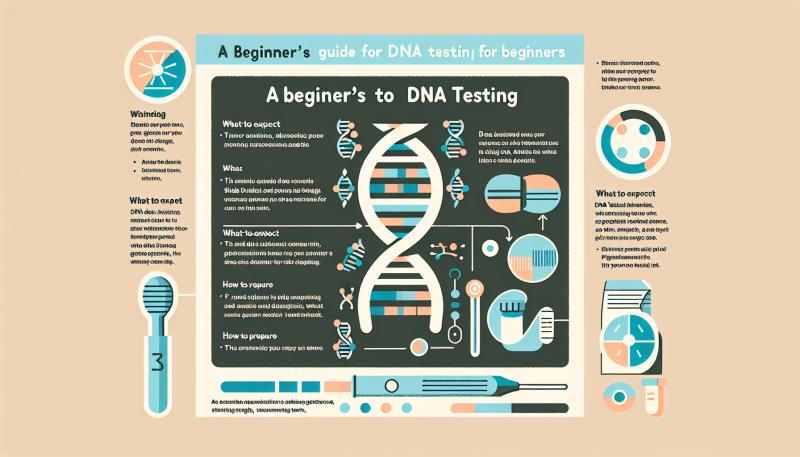
A Beginner’s Guide to DNA Testing: What to Expect and How to Prepare
DNA testing has become an increasingly popular tool for individuals seeking insights into their ancestry, health, and genetic predispositions. Whether you're looking to explore your family history or gain information about potential health risks, understanding the different aspects of DNA testing is essential. This guide will walk you through what to expect and how to prepare for your first DNA test.
Understanding DNA Testing
Before diving into the preparation and process of DNA testing, it's important to understand what DNA testing is and the various types available. At its core, DNA testing involves analyzing your genetic material to provide information about your physiology, ethnicity, and genetic health risks. Here are some common types of DNA tests:
- Ancestry Testing: This type of test is designed to give you insights into your genetic heritage and trace your family lineage through your DNA.
- Health Screening: Health-related tests provide information on your genetic predispositions toward certain diseases or conditions.
- Relationship Testing: Often used in legal situations, relationship tests (such as paternity tests) determine familial relationships through genetic comparison.
What to Expect from DNA Testing
Depending on the type of DNA test you choose, the process and outcomes can vary. Here’s an overview of what you can generally expect:
The Testing Process
- Sample Collection: Most DNA tests require a simple saliva sample or cheek swab, making it non-invasive and easy to do at home.
- Submission: You will mail your sample back to the testing company using the pre-paid packaging usually included with your kit.
- Analysis: In the laboratory, advanced technologies are used to analyze the DNA. The turnaround time can range from a few days to several weeks, depending on the company and type of test.
- Results: Results are typically sent through a secure online portal or via mail, providing insights into your genetic information.
Results Interpretation
Understanding the results is crucial. Most companies offer personalized reports that break down your genetic information into easy-to-understand data. For ancestry tests, you might receive information regarding your ethnic background and potential relatives. Health screenings may provide you with data on genetic markers for conditions like heart disease or cancer. Always consider discussing complex results with a healthcare professional for a comprehensive understanding.
How to Prepare for DNA Testing
Preparation for DNA testing is straightforward, but there are a few steps you can take to ensure accurate results:
- Research Testing Companies: Not all DNA testing services are the same. Companies like IMS Screening Solutions offer various types of tests, each with its own strengths. Consider what you want to learn from the test and choose a reputable provider.
- Understand the Privacy Policies: Ensure the company has clear policies regarding the security and privacy of your genetic data. Knowing how your data is used, stored, and shared is crucial.
- Avoid Eating or Drinking: For saliva-based tests, refrain from eating, drinking, smoking, or chewing gum at least 30 minutes before collecting your sample to avoid contamination.
- Review Instructions Carefully: Each kit comes with specific instructions. Carefully follow every step to ensure the validity of the sample provided.
Potential Benefits of DNA Testing
DNA testing can offer numerous benefits that span various areas of life:
- Health Insights: Gain a better understanding of your genetic predisposition towards certain health conditions, enabling proactive management of your health.
- Understanding Ancestry: Learn more about your ancestry, discovering where your ancestors came from, and potentially connecting with distant relatives.
- Personalized Medicine: Knowing your genetic makeup can inform personalized medical treatments and lifestyle changes for enhanced wellness.
Considerations and Ethical Implications
As the popularity of DNA testing continues to rise, understanding the ethical implications is essential.
- Privacy Concerns: Consider how your data might be used or shared. While companies like IMS Screening Solutions prioritize data security, always be informed about consent agreements relating to your data.
- Emotional Impact: DNA results might not always align with personal or familial beliefs and could reveal unexpected information about family relations or health risks.
- Data Ownership: Understand your rights related to your genetic information, including the possibility of withdrawing your data from the company's database if desired.
Conclusion
DNA testing provides a powerful window into your genetic blueprint, offering insights into your past and potential future. By understanding what to expect and how to prepare, you can navigate your DNA testing experience with greater confidence and clarity. Remember to research and select a reputable provider like IMS Screening Solutions to ensure you receive accurate and secure results. As with any major decision affecting your health or family, consulting with professionals can provide additional guidance tailored to your unique needs.
Prepared individuals taking these steps will find the DNA testing journey an informative and empowering experience, leading to a better understanding of themselves and their genetic identity.
